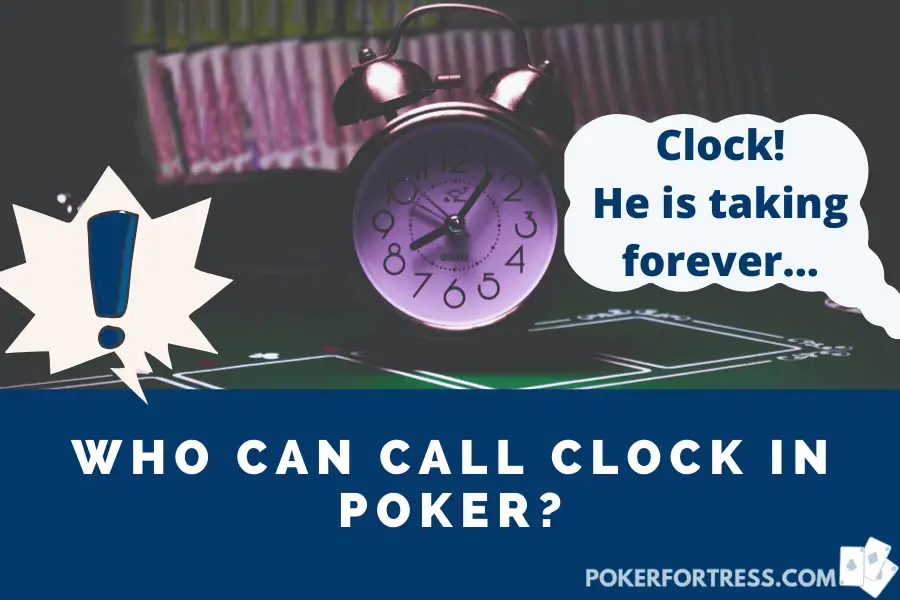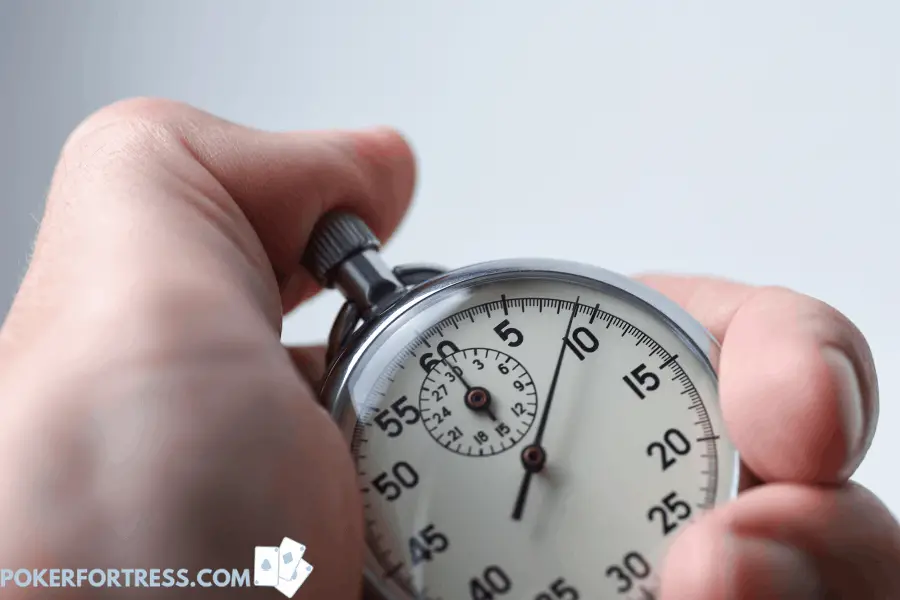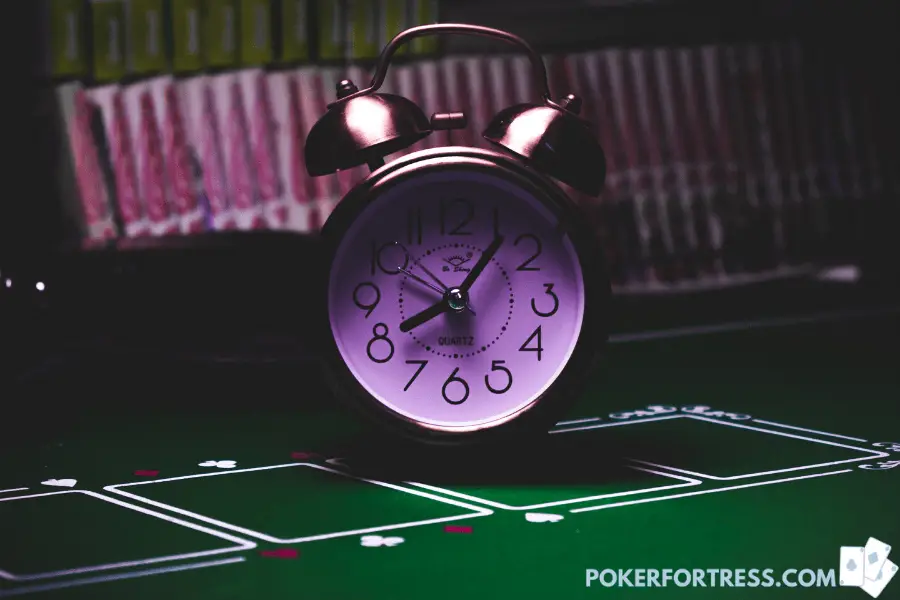Calling the clock is one of the facets of poker that has generated a lot of controversies in recent years. While some private games don’t allow players to call clock, it’s a rule that has been enforced by poker tournaments like WSOP. If you have not acquainted yourself with the regulations governing this move yet, this article will help explain it in detail, including the people who are allowed to initiate the move.

Who can call clock in poker? Any player on the poker table can call a clock. When a player calls the clock, the floorperson is summoned. The floor person checks with the dealer to be sure the player who the clock was called on was indeed wasting time.
After the dealer confirms this, the floorperson announces to the offending player that he/she has a time limit of either 30s or 1min to make a move to avoid forfeiting the hand. In some tournaments, the floorperson is given the power to call clock if they have reasons to believe a player is tanking excessively.
Calling the Clock
While many players frown at calling the clock in poker, the reality is that this move is sometimes needed to speed up gameplay. We all know that poker is a game that requires players to make difficult choices, but it can become frustrating when players take too much time to act their turn. The longer they delay their move, the longer the hand becomes, making it essential to call the clock.
Once a player calls the clock, the floor person has to come over to the table. Floorperson needs to confirm from the dealer that the player who the clock was called on, has indeed taken too much time to act his/her turn. There’s no specific time stipulated for all poker players to make a decision before opponents can call the clock on them. In fact, the new rule on calling the clock in the World Series of Poker allows players to call the clock at any time.

Depending on the house rules, the total time allowed to act a turn could be up to 2 minutes. Once the dealer has confirmed that a player is taking too much time to act, he informs the player that he only has 30 secs or a minute to act his turn to avoid his hand becoming dead. There is a verbal 10 seconds countdown by the floorperson before the timer counts out. If the player is unable to make a decision before the time elapses, he/she will be forced to forfeit the hand.
Tanking
Tanking happens when players take too much time to act on their turn. It is this indecisiveness that could lead to other players calling the clock on them during a hand. The word ‘tank’ is an abbreviation of ‘tank bank’ and has since been the term of choice used by players to describe the act of taking too much time to make a decision during a hand. While players can tolerate tanking, excessive tanking is considered to be bad poker etiquette and could lead to an opponent calling the clock on the player(villain).
Although tanking is frowned at in poker, it is common knowledge that many players still tank. Why is this the case? One of the most frequent reasons a poker player would tank is when he/she is facing a high stake game or very important decision. With a large bet to call, the pressure to make the right decision is high. In that case, players often take a considerable amount of time to analyze their options and choose the best possible move.
Tanking is especially popular also in tournaments when it is getting close to being in the money. Short stack players would often wait all the allotted time before making their hand, which is most often a fold. They are trying to get into the money by stalling and hoping that someone else will bust sooner. This is a lot more common in online games where you don’t need to deal with angry looks for taking so long for every move.
Also, amateur players are more likely to tank during a game of poker. With their knowledge of the game still evolving, it’s normal that they aren’t so confident about their decisions. It is, therefore, natural that they would take more time to think up the best possible move.
Reasons why you Should not Tank
The general consensus is that tanking is bad for poker. Unfortunately, this ideology hasn’t stopped pros and amateurs from tanking heavily. In case you’re wondering, here are three reasons why tanking isn’t acceptable.

- It’s bad Etiquettes: Why some players believe it’s wrong to call the clock on opponents, the real problem is the player who tanks. When you tank excessively, you reduce the excitement of the game as well as the number of hands time will allow.
The game is supposed to be enjoyable as much as it is rewarding. Spoiling the fun for everyone is downright bad etiquette. - Setting bad Standards: Any poker enthusiasts would agree with me that poker players love to imitate other players they consider to be superior.
The imitation plague is the reason why many players walk into games wearing hoodies, sunglasses, baseball hats, and other unusual attires. If amateur players watch pros tanking as if their lives depend on it, the chances are that you’re going to see a lot of tanking in their next game.
However, just like pros can set bad examples with excessive tanking, they can set good ones as well. If more pros are opting to play quicker, they can influence amateurs to do the same. - Not Beneficial to Winning Players: The goal is to become a winning poker player, and if that’s what you are, you’ll certainly be looking to increase your winnings per hour.
Unfortunately, if 6 guys on the table take 3 minutes or more to act their turn, you’ll undoubtedly be participating in fewer hands because of the time wastage. It is, therefore, in your best interest that the average game time for each hand you play is not extended by unnecessary tanking. - Ruins the Experience for Recreational Players: While many players are all about the pot, recreational players simply want to enjoy playing the game they love. They are there for the excitement and unpredictability of the game.
Unfortunately, nothing is exciting in watching your opponent take all the time in the world to make a simple move. When you tank excessively, you’re merely ruining it for recreational players.
Should you Call the Clock on an Opponent?
Poker is a game that will require you to confront an opponent at some point. Whether it’s raising the opponent’s bet or calling it, these actions are confrontational in their rights. Therefore, the issue of calling the clock on opponents should be seen as just another element of playing aggressively.
Unfortunately, there are still players who frown at opponents calling the clock, and there are others who consider the move as being too ”in your face.” The problem here is that the game of poker gets to suffer the consequences of excessive tanking. Nobody likes a boring game, and when players are spending 3 to 5 minutes on decisions that should be automatic, a boring game is exactly what you get.
The stain of tanking is even more damaging on tournament poker that enjoys TV coverage. While a player could possibly endure an opponent’s tanking for the sake of the game, viewers sitting in front of their TV are not so patient.
Hence, it is a no-brainer for players to call the clock on opponents who are tanking excessively. Almost every poker player won’t hesitate to call out a string bet. So why should it be hard to call the clock?
From my experience, I have noticed that calling the clock on an opponent forces them to make their play real quick. In fact, most players who have the clock called against them usually make their move even before the floor person arrives.
When players are willing to call the clock on any player who is tanking, the ripple effect that is caused by the energy in that decision affects everyone on the table. Not only does a clock quickens the action of the player it is called on, but it also acts as a warning to other players on the table, reminding them that slow play would not be tolerated by any means.
Alternative to Calling the Clock: Shot Clock

Before now, there was no specified time allocated for players to make their moves before the clock can be called on them. Even with the option to call clock, some players are reluctant to use it as they do not want to sound rude. One practical innovation that has been used to prevent players from tanking is the shot clock. It has its use in live tournaments.
The shot clock is, in fact, a physical clock placed on the table. It presents a time limit allocated to players to act a hand in poker. With the clock ticking away, players have no choice but to make their move as quickly as possible to prevent ending up with a dead hand. The time allocated on the shot clock may vary depending on the tournament rules. However, most tournament adopts a 30 seconds time limit.
Another exciting thing about the shot clock is that players may be allocated with time bank cards at the beginning of a hand. These cards can be used to buy more time if a player feels he/she needs more time to make a move. These cards can buy additional 60secs or 30secs as the case may be.
The shot clock became popular after the World Poker Tour decided to introduce a 30secs clock during the Main Tour event Season XVI in 2017.
Players were given time chips that could be used to buy more time during the later stages of a hand. While other tournaments had already been using the shot clock, it was its use in WPT in 2017 that is considered the turning point in the use of shot clocks in poker.
World Series of Poker Rule on Calling Clock
The WSOP is one of the biggest poker tournaments on the globe. It is, therefore, not surprising that they have responded to calls to checkmate excessive tanking by establishing new rules.
Old Rule
In the old rule, players were allowed to call the clock on any player who did not act their turn after a reasonable amount of time. While WSOP failed fo explicitly mention how much time was ”a reasonable amount of time,” it was generally understood that players could wait for 2 minutes before calling the clock on an opponent who is tanking.
After calling the clock on an opponent, the floorperson is summoned by the dealer. When the floorperson arrives, he confirms with the dealer that the ”villain” indeed tanked for longer than the amount of time allowed. When the dealer confirms this, the floorperson gives the player a 50 seconds countdown, and when the countdown ends without the player acting his/her turn, a verbal 10 seconds countdown follows after which the villain’s hand becomes dead.
New Rule
The new rule eliminates the 2 minutes ”reasonable amount of time.” This rule allows players to call the clock on an opponent whenever they wish to. The rules still allow the dealer to call the floorperson who has to confirm a player has been tanking before initiating a countdown. However, the countdown would take just 30secs with a 10 seconds verbal countdown. Also, the new rule allows the floorperson to start the clock whenever he or she believes a player has been tanking excessively.
Reaction to the Rule Change
The new rule is a positive step. To be honest, if players are taking over a minute to act their turns, they’re already tanking. Allowing players to call the clock at any time and encouraging them to do so promotes a faster, more exciting game. Also, the WSOP has done a good job giving the floorperson the power to call the clock. This part of the rule helps to checkmate players who are reluctant to call the clock on opponents who tank.
However, the laborious exchange between the dealer and the floorperson is one aspect of the rule that needs to be eliminated. Calling the clock is supposed to increase the pace of the gameplay. Yet, when the dealer has to call a floorperson who will need confirmation that what they have been summoned for indeed took place, you get a process that’s taking even more time than some players who tank.
While the new rule is a step in the right direction, a huge tournament like the World Series of Poker has to do more to see that tanking is kicked out of the game.
Calling the Clock Vs. Shot Clock
While calling the clock does its best to ensure players do not tank excessively, many are of the opinion that having a shot clock in all tournaments would be the best move for the game. Take online poker games, for example, where tanking is not an issue because players know they have a specified time to act their turn. Introducing a shot clock would undoubtedly increase the pace of no-limit games and eliminate the process that follows calling clock.
Also, a shot clock will reduce the tension on a poker table. With some players believing that calling the clock on an opponent is bad manners, a lot of tanking are overlooked just to avoid confrontations. With a shot clock, every player on the table knows what they are signing up for once they sit on the table. Taking the decision to checkmate tanking out of the hands of poker players will no doubt improve the harmony on poker tables.
On the other hand, a shot clock will drastically reduce the number of time players has to act their turn. Depending on the situation, some moves will only take 10secs while others may take up to a minute. Sometimes, players need extra time to make the best move. While a shot clock will no doubt improve the pace of no-limit poker, it also increases the pressure on players to make a quick decision. For players who like to have ample time to think up the best possible move, the shot clock is bad news.
Final thoughts
Whether you’re a fan of calling the clock or you simply want a shot clock introduced, one thing that’s for sure is that tournaments won’t have any need to introduce a time limiting clock if players don’t tank excessively.
The real issue is with players who take too much time to make decisions during a hand. If we’re to eliminate annoying clocks that stop us from having those extra 20 seconds to analyze a situation effectively, then we must learn to eliminate tanking from our gameplay.
Playing slow gives poker a bad name. If we’re to improve the image of the game, all hands must be on deck to eliminate stalling and tanking. As players who love the game, we all must play our parts. If you don’t need more than 10 seconds to act your turn, then don’t take any more time than you need.
Also, if you’re playing against an opponent who tanks excessively, it is your duty to call the clock on that player whether or not you’re in the hand. Lastly, players must change their opinion on calling the clock. It is not rude; neither is it meant to promote bad blood amongst players. If we all learn to treat the game with respect by not slow playing, poker will be a lot more fun to play.




